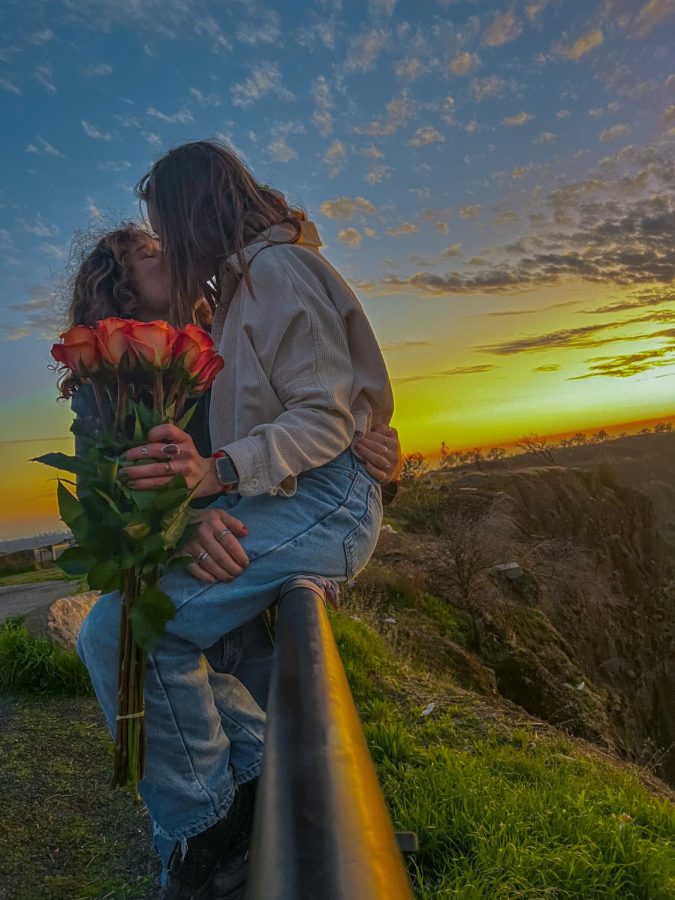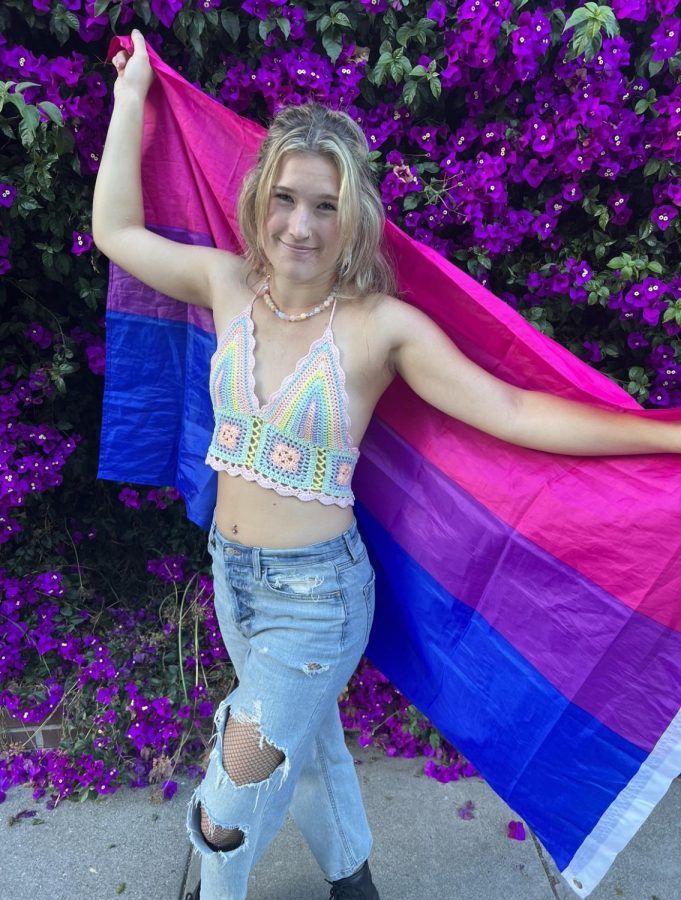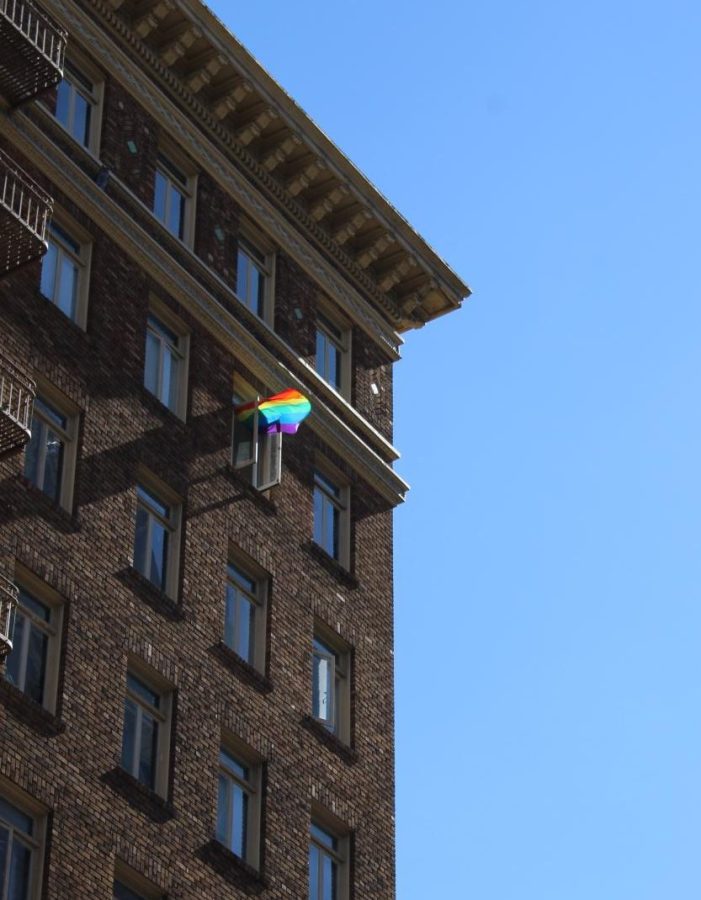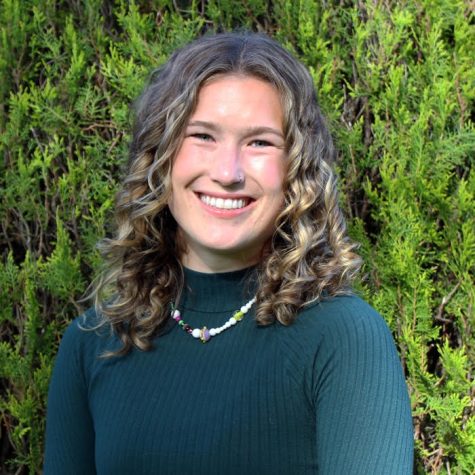I realized I was bisexual when I learned what scissoring was and responded with, “that sounds so hot I would totally do that.”
It wasn’t until summer of 2021 that I started questioning my sexuality. I fit all of the closeted gay stereotypes. I was self proclaimed “straight, but gay when drunk,” “straight, but only gay for Halsey,” and “straight, but would be down to kiss girls.”
My friends figured out I was bi before I did and would hit me with a, “Hunter are you sure you’re not into women?”
People have varying experiences when it comes to identifying and understanding their sexuality. My personal experience felt almost intrusive. In a heteronormative culture, it is common to unconsciously assume that people are heterosexual until proven otherwise. I internalized this and because I experienced attraction towards men, I assumed that I was straight.
Part of the reason it took me so long to publicly come out as bi stemmed from me not wanting to intrude on the LGBTQIA+ community. I had an internalized belief that if I came out as bi, I was somehow taking away from others within the queer community.
I felt unsure if I would be welcomed into the community — even if it was one meant to represent acceptance.
There is an issue with biphobic members of the LGBTQIA+ community who have created an undertone to the community implying that bi people are less worthy of representation.
The term “straight passing” refers to a person who identifies as queer, but who is perceived to be straight by the general population. This term has been used to insinuate that a bi person, who is in a heterosexual relationship, experiences privileges that other members of the LGBTQIA+ community cannot. It has become an isolating term that is often used in a context that implies that bi people are not true members of the queer community.
Growing up, I did not see a lot of representation surrounding bisexuality. In fact, the only representation of bisexuality in pop culture I saw was never labeled as an actual sexuality, but acted out as a stereotype. Often this representation looked like a side character known to be a cheater or was deemed ‘slutty’ for making out with girls and guys at parties. It was often the character who was seen as “easy” and not respectable. Brittany S. Pierce from the TV show “Glee” is one example of this trope.
Under these circumstances, who would be eager to label themselves as bi?

Shortly after I realized I was bi, I found myself at a local bar in Chico flirting with a woman. We were both overly confident and bold with the help of alcohol, and ended up kissing in the middle of the bar. I remember sobering up in my mind as I kissed her and thinking, “Well, I guess I am publicly out now.”
After kissing her, I felt buzzy with an energy I had not experienced before. It wasn’t the same as when I first kissed a boy, it was a braver and more powerful buzz. Part of me was scared because I did not know how this would change my life, and I had just committed to being seen as gay — at least by the people in my immediate surroundings. This was my first time publicly going against society’s grain. It was both terrifying and enthralling.
A man in his mid-thirties, and much larger than both of us, loomed over with a grotesque expression on his face.
While looking at us, he said one word, “ew.”
He wasn’t violent, but his outward expression of disapproval, combined with my knowledge of gay history made me feel small and dehumanized. Even in small moments like this, there is nothing as disheartening as the feeling of other people’s hate surrounding who you love. Granted, I was not in love with this woman I had just met, but I was happy. I was like an elementary school kid who had just been given a flower by their crush — giddy and excited. To have another human want to shame me for something as pure and natural as that, is a physical heartbreak difficult to describe.
Prior to this I had imagined I would experience homophobia through rare dramatic encounters with extremists who hated me. What I did not expect was the constant microaggressions from heterosexual homophobes, as well as biphobic people within the LGBTQIA+ community.
For the first year after coming out, I was loud about my sexuality. I wanted people in my life to know I was bi. It was a piece of my identity that had been missing and once I found it, I wanted those who cared about me to know how much I loved women. I had a friend who even told me I seemed “too excited” about being gay.
Being more open about my sexuality, I started noticing a change in conversations others would have with me. The conversation of threesomes was brought up more frequently, and people asked me for details about my sex life.
I’m not one to mind a playful conversation about sex, but this repetitive conversation took a different tone.
It became apparent that my bisexuality seemed like a “way in” for other people’s sexual fantasies.

Whether a fantasy of participating in a threesome, or a fetish of lesbian sex, my sexuality —and therefore part of my identity — began being sexualized on an almost daily basis.
“You should pick up a hot girl and then hit me up,” “We could share her,” “So you like to eat pussy then? That’s hot.” “You must have threesomes all the time then huh?” are all phrases I’ve heard countless times.
As an athlete, the most demoralizing piece of this came from teammates and friends. I did not expect people who I train with — and assume to have mutual trust and respect with — to use my sexuality for their personal benefit. Even if it wasn’t conscious, my sexuality was viewed as a door for them; not as a piece of what makes up my experiences in the world.
On a Friday over winter break, a girl that I was dating visited Chico for the first time and we went out for drinks. It was dark and we were walking together holding hands. After being violently yelled at from passing cars twice on our walk, we dropped hands and walked a further distance apart from each other because we felt it was safer.
I am not going to be thankful that “things are better now than they were 50 years ago,” because frankly, “things” are still pretty bad. Instead, I will be thankful for activists like Bayard Rustin, Audre Lorde and Billie Jean King who went against society’s grain and pushed us toward a more loving, and accepting standard.
But, there’s still work that needs to be done.
Hunter Casperson can be reached at orionmanagingeditor@gmail.com









Mara // Mar 21, 2023 at 6:45 pm
I was already a staunch ally.
As I explore my newly-labeled agender gray asexual self (I still hate labels, but I am learning some things by learning the labels) a little more. Now I’ve learned the term “straight passing” privilege. As you say, this used to be held up exclusively against bisexuals, but apparently it’s also held up these days against asexuals and non-presenting agenders in queer circles…. literally I find there are LG-only, LGB-only, LGBTQ-only gatekeepers who honestly resent the LGBTQ+ and LGBTQA+ groups. It makes no sense; are people really that self-unaware or even sociopathic?
The irony about it in asexual circles is that there is even a vocal contingent of gatekeeping in that community because the “true” asexuals with _zero_ sexual attraction dismiss it as a spectrum the other types of asexuals, or those who are “flux” meaning they are generally asexual, but sometimes aren’t… or the people who might be asexual due to external or medical factors. It’s not unlike the trans medicalists in the transgender community (you are only trans if you fully transition).
The agenders I have met, in contrast, have been really nice, supportive, and informative.
Be that as it may… my full buy-in to the feminist concept of intersectionality has been brought to bear.
Privilege is a tool for self-reflection. You cannot judge other people’s privilege. You have no idea how whatever privileges they may have access to are actually realized because of hidden factors. Even if someone is “straight passing”… straight passing in the eyes of who? In hindsight I was called gay by many bullies because of my disinterest in participating in sexualized conversation. Yes, I am now married with kids, but that’s not my identity in my mind… it’s part of me, but I carry a lot of other things around with me (like autistic traits) so that I cannot tap into that privilege the way the privilege police think I can… and with them lacking that privilege, how can any limited acquaintance even know how it affects me personally? Conversations with my neighbors are guarded. I feel no community anywhere. I am caught in the middle.
I am also not under any obligation to disclose to anyone or come out to anyone or share my experiences with anyone in order to validate myself to anyone; by demanding such a thing they have already proven themselves unworthy of knowing me or being trusted with that information. They are not my judge, they do not get to rule on the merit of my lived experiences. Apparently being agender and asexual as I am was diagnosable as a psychological disorder even only 10-years ago. Homosexuality was removed in 1973.
It’s gatekeeping. Gatekeeping invalidates lived experiences. Gatekeeping weakens the collective. Being part of a marginalized group does not give people any particular insight and certainly doesn’t impart empathy.
The point of struggle is to make the way easier for those who come after.
Love to you all